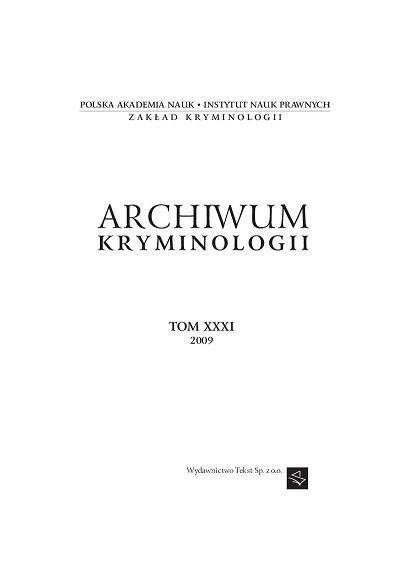Międzywojenna polska debata kryminologiczna-poszukiwanie społecznych przyczyn przestępczości i sposobów jej zwalczania
Criminological debate in interwar Poland. Search for social causes of crime and measures of fight with crime
Author(s): Mateusz RodakSubject(s): Law, Constitution, Jurisprudence
Published by: Instytut Nauk Prawnych PAN
Keywords: HISTORY OF CRIME AND DELINQUENCY; CRIME PREVENTION;
Summary/Abstract: This article is an attempt of a summary of the debate, pending in Poland in the interwar period, on the issues related to the etiology and methods of preventing and / or controlling crime. Analyzing these two highly interrelated and interdependent problems, the author decided to take into consideration the clear-cut division in criminology prevailing in the interwar period and to reflect it in the structure of the article. Thus, the text is divided into two parts. The first part discusses the causes of crime, the second the criminal policy. However, the text is not an analysis of all the causes of crime. The author focuses on discussion of the interwar views on the social causes of crime held by persons or institutions related, on various different levels, to criminology. Accordingly, the section on criminal policy includes response to crimes being, at least in theory, a result of social causes. The autor of the article faced the problem to attempt to collect and present ideas on social causes and method of preventing and / or combating crime published in the interwar period. The study covers articles and books, in which the above-mentioned problems have been discussed both by scientists (criminologists, lawyers, doctors, psychologists, and sociologists) and laymen (journalists, publicists, community workers, and politicians). In this text, the attempts to analyze the opinions expressed by the latter of the aforementioned groups is a significantly new thing. The views of people not directly related to the academic community at that time were rarely taken into the consideration while discussing criminological theoretical considerations of the interwar period. The point of departure of this text is assumption of the thesis that in the interwar debate on the broad issue of crime, the views which favoured social factors in generating crime were significantly dominant. It should be recalled that on the other side of the dispute there remained a theory of special importance of so-called endogenous factors. It was argued that the specific psycho - physical construction of a man makes him predisposed to become a criminal. This was an aftermath of a C. Lombroso’s theory, already modified in the interwar period. It should be noted that his theory in Poland was not received unquestioningly. However, the dispute between supporters of exogenous and endogenous factors took place in interwar Poland. A strong trend was a school trying to combine the two trends, taking into account the reasons of both parties as typically they did not exclude. This should be regarded as a unique achievement of the Polish criminology of the interwar period.
Journal: Archiwum Kryminologii
- Issue Year: 2009
- Issue No: XXXI
- Page Range: 101-146
- Page Count: 46
- Language: Polish

